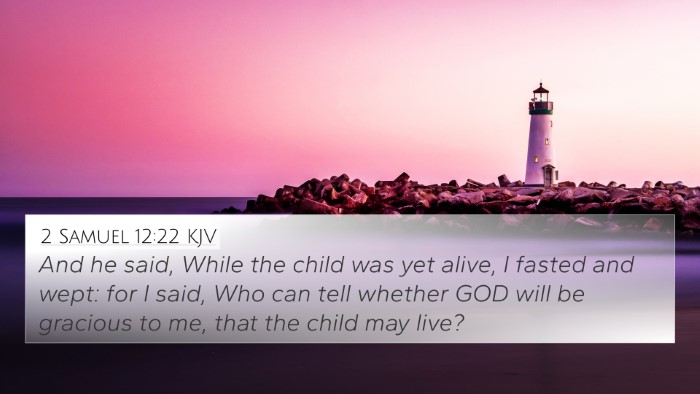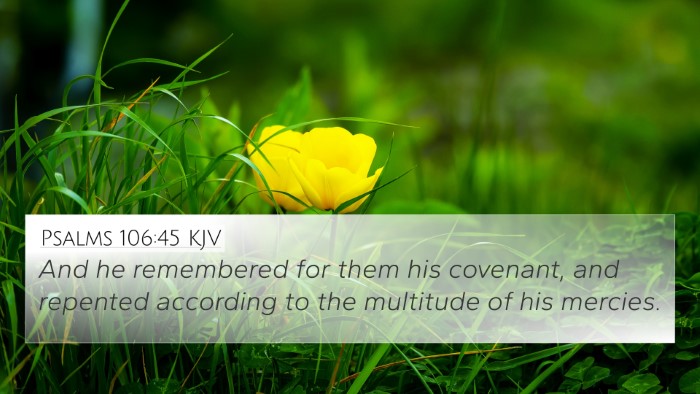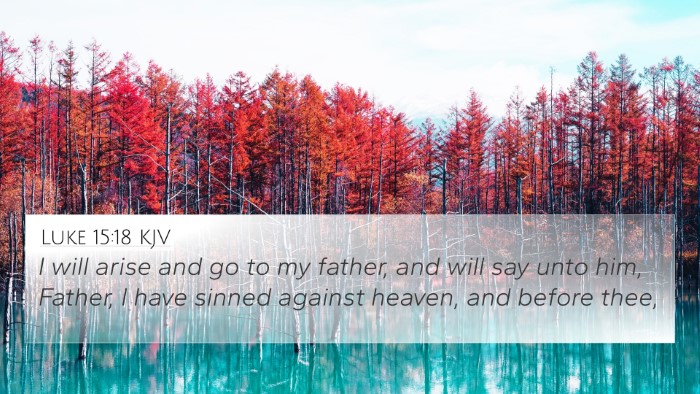Old Testament
Genesis Exodus Leviticus Numbers Deuteronomy Joshua Judges Ruth 1 Samuel 2 Samuel 1 Kings 2 Kings 1 Chronicles 2 Chronicles Ezra Nehemiah Esther Job Psalms Proverbs Ecclesiastes Song of Solomon Isaiah Jeremiah Lamentations Ezekiel Daniel Hosea Joel Amos Obadiah Jonah Micah Nahum Habakkuk Zephaniah Haggai Zechariah MalachiJonah 3:9 Similar Verses
Jonah 3:9 Cross References
Who can tell if God will turn and repent, and turn away from his fierce anger, that we perish not?
Uncover the Rich Themes and Topics of This Bible Verse
Listed below are the Bible themes associated with Jonah 3:9. We invite you to explore each theme to gain deeper insights into the Scriptures.
Jonah 3:9 Cross Reference Verses
This section features a detailed cross-reference designed to enrich your understanding of the Scriptures. Below, you will find carefully selected verses that echo the themes and teachings related to Jonah 3:9 KJV. Click on any image to explore detailed analyses of related Bible verses and uncover deeper theological insights.

2 Samuel 12:22 (KJV) »
And he said, While the child was yet alive, I fasted and wept: for I said, Who can tell whether GOD will be gracious to me, that the child may live?

Joel 2:13 (KJV) »
And rend your heart, and not your garments, and turn unto the LORD your God: for he is gracious and merciful, slow to anger, and of great kindness, and repenteth him of the evil.

Psalms 106:45 (KJV) »
And he remembered for them his covenant, and repented according to the multitude of his mercies.

Jonah 1:6 (KJV) »
So the shipmaster came to him, and said unto him, What meanest thou, O sleeper? arise, call upon thy God, if so be that God will think upon us, that we perish not.

Amos 5:15 (KJV) »
Hate the evil, and love the good, and establish judgment in the gate: it may be that the LORD God of hosts will be gracious unto the remnant of Joseph.

Luke 15:18 (KJV) »
I will arise and go to my father, and will say unto him, Father, I have sinned against heaven, and before thee,
Jonah 3:9 Verse Analysis and Similar Verses
Understanding Jonah 3:9
Verse: “Who can tell if God will turn and repent, and turn away from his fierce anger, that we perish not?” - Jonah 3:9
Contextual Overview
The Book of Jonah is a unique narrative that highlights themes of grace, repentance, and God's mercy towards the Gentiles, especially the people of Nineveh. Jonah's journey from reluctance to obedience provides critical insights into God's character and the power of repentance.
Meaning and Interpretation
In Jonah 3:9, the king of Nineveh expresses uncertainty yet hope about God's potential to spare the city from destruction. This verse encapsulates the king's acknowledgment of God's sovereignty and compassion, emphasizing the importance of genuine repentance.
Insights from Commentaries
- Matthew Henry:
Henry highlights that the king's question reflects both humility and desperation. It acknowledges that although God is just, He is also inclined to mercy. The call for repentance is a recognition of God's authority and capability to alter the course of judgment.
- Albert Barnes:
Barnes explains the theological implications of the king's inquiry. He emphasizes that it shows an understanding of God's character—recognizing that while divine judgment is imminent, it does not preclude divine mercy, thus inviting the possibility of renewed favor through repentance.
- Adam Clarke:
Clarke brings forth the idea of God’s unpredictable nature in terms of judgment and mercy. He notes that the king's plea reveals a deep-seated understanding that true repentance can potentially avert disaster, highlighting God's desire for His creation to turn back to Him.
Cross-References and Thematic Connections
This verse connects with several others within the Scriptures that highlight themes of mercy, repentance, and God's desire to forgive. Here are some relevant cross-references:
- Exodus 34:6-7: This passage emphasizes God's merciful nature, illustrating that He is "abundant in goodness and truth."
- 2 Chronicles 7:14: This verse calls for national repentance and assures God's readiness to respond to genuine contrition.
- Joel 2:13: An invitation to return to God with all one's heart, demonstrating His compassionate nature.
- Ezekiel 18:30: God urges His people to turn from all their offenses, indicating His willingness to forgive.
- Luke 13:3: Jesus’ call to repentance underscores the necessity and urgency of turning from sin.
- Romans 2:4: It describes God's kindness leading people to repentance, aligning with the theme of divine mercy.
- 2 Peter 3:9: God is patient, not wanting anyone to perish, illustrating His desire for all to come to repentance.
- Hebrews 10:26: This passage discusses the seriousness of willful sin, reinforcing the need for repentance.
- Revelation 2:5: A call to remember and repent, highlighting the cyclical nature of God’s calls for His people to return.
- Luke 15:7: The joy in heaven over one sinner who repents, showcasing the significance of repentance in God’s eyes.
Conclusions and Reflections
Jonah 3:9 invites believers to reflect on the nature of God—His justice, mercy, and readiness to forgive those who sincerely repent. The king of Nineveh’s statement serves as a model of humility and awareness of divine authority, which is crucial for any genuine relationship with God.
Tools for Further Study
For those interested in deeper study and exploration of biblical connections, consider utilizing these tools:
- Bible concordance to find relevant verses and themes.
- Cross-reference Bible study guides to uncover thematic links between scriptures.
- Digital Bible study applications that provide integrated cross-references.
- Comprehensive Bible reference resources to facilitate understanding of Biblical narratives.
- Discussion groups focused on inter-Biblical dialogue to gain insights from diverse perspectives.
Summary
Jonah 3:9 serves as a pivotal moment in the narrative, encapsulating the critical themes of repentance and divine mercy. The king of Nineveh's call to God articulates a deep understanding of the hope available through sincere turning toward God. This verse not only resonates within its own context but also interlinks beautifully with other scriptures that emphasize God’s unfailing mercy and the necessity for humankind to seek repentance.


